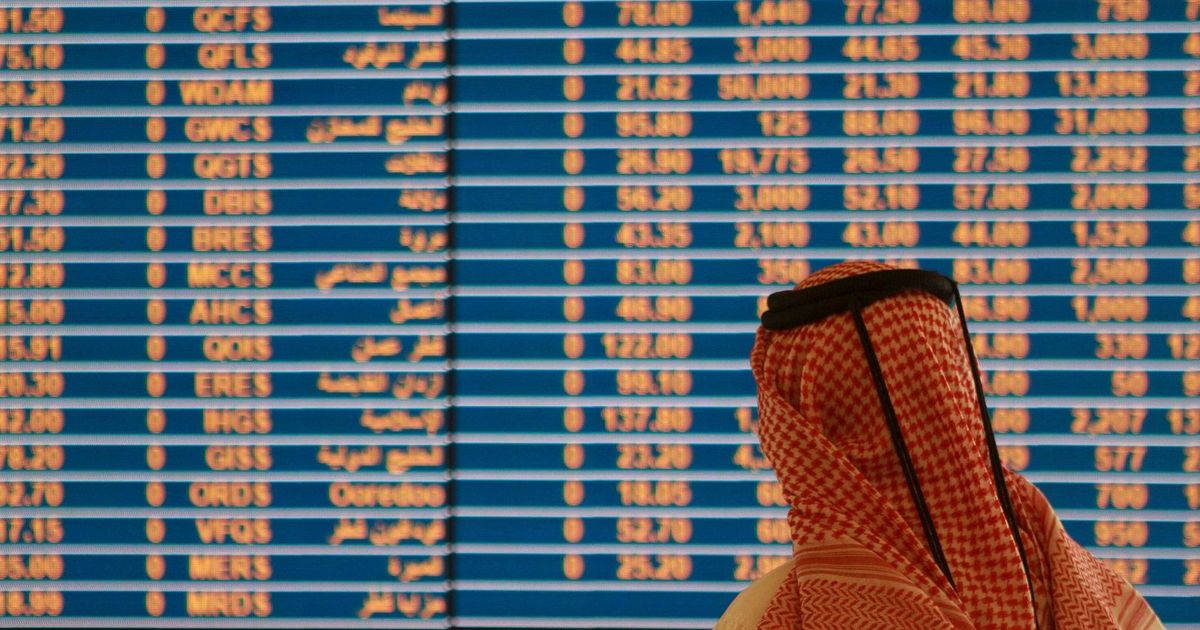The Arab stock markets suffered heavy losses today, on Sunday, with the pressure of a mass decline in leadership sectors, amid a wave that swept the global financial markets after the new US Customs duties came into effect, in light of a mutual eschalation with various countries around the world. The leadership sectors in the Arab stock exchanges were a witness to a collective decline, and banks, energy, industry and real estate are the most prominent losers today, and the losses of leadership sectors ranged from 3.7% to 7%. The Saudi -“Tassi” index has closed 6.8% to 11077 points, which scored the lowest level since December 2023, and the largest daily loss since early May 2020, under pressure from the banks and basic materials by 7% each and energy by 5.3%. Ibrahim Al -Nuwaibt, CEO of the “financial value” business, believes that “the decline in all sectors indicates that the descent is linked to a psychological condition, not a realistic condition,” to add an interview with “Al -Sharq” that the market will return to its normal position “when the psychological state” has improved for clients. Maybe we see a quick return. 6.75%, banks 5.6%, technology 5.7%, financial services are 6.2%, real estate 5.1%. The decline resulted in the National Bank of Kuwait, which fell by 7%, while the Burgan Bank shares fell 6.7%, Eva Hotels 12.2%and “Arzan” 9.9%and “Industries” 8.2%. Banks and financial services 3.9%, industrial sector 6.3%and the property sector 3.7%. The shares of “Qatar Industries” fell 8.2%, “Qatar National Bank” and “Qatar Islamic Bank” by 4%for each of them, while the real estate shares “lost” Ezdan Holding “5.2%. The Muscat Market Index fell 2.6%. While the Bahrain Market Index recorded the lowest loss of 1%. The declines come amid a wave of deviation from the dangerous assets in the global markets last week, following statements by Federal Reserve President Jerome Powell, warning that the economic damage to the trade war could be greater than expected, with the possibility of high inflation and slowdown. As for the UAE markets, which close their doors today, the trading has ended the losses of all its profits last week since the beginning of the year. Panic in Egypt, and the losses of the main index of the Egyptian Stock Exchange “EGX 30” was 3.3%, with the banking sector falling 2.5%, basic resources 3.7%and real estate 4.3%. Leadership shares have recorded a collective decline as the share of ‘EFG Holding’ fell 4.9%, “Fawry” by 7.45%, “Commercial International Bank Egypt” 1.38%, “Belton” 4.25%, “Talate Mustafa” 4.49%, and “Palm Hills” 4,65. “Today’s descent is a state of panic without a state of reason. There were no major fees on Egypt or the amount of exports to the United States will affect the economy. The matter in Egypt is only a panic condition stretching out of the world markets, especially because the Egyptian market has a large percentage of individual investors exceeding 70%.” A sharp drop in the global markets, the “S&P 500” index, has losses of about $ 5 trillion in two days in its worst performance since March 2020, after a sharp drop of 6% Friday. While the Nasdaq 100 index officially entered the falling market area, it pulled over more than 20% of the last high. Oil prices folded to their lowest levels in four years with the decline of the Western Texas -Tussentage futures, about 14% in just two days – which near the $ 61 per barrel equal to the sharp losses they entered into during the epidemic – while the brittle of the brittle ended at the lowest level. Poor demand raw materials. The price of copper fell by 67.7% to reach its lowest level since January, while futures for reference to natural gas in Europe at one time fell by more than 10%. The wave states are subject to the minimum fees of Trump, the imposition of a minimum of 10% of customs duties on all countries exported to the United States, including the Gulf States, announced. While additional fees were set between 30% and 41% on six main countries, including China, Japan and European countries, the market raised concerns about the future of the global trading system. Observers believe that the potential effects of Trump’s commercial policy will not only impose fees, but can expand to include universal supply chains and an increase in raw material prices, which means that the effect will be short -lived and not excluded from any country. Majid Al -khaldi, the first financial analyst of the newspaper “Al -iqtisadiah”, said during an interview with “Al -Sharq” that the flurry of sale seen by the global commodity and money markets reminds us of the days of Corona, “adds that the psychology of customers is weak, saw in the market during the weekend, due to US customs duties and the Chinese reaction, in addition to the drop in oil prices, “according to Al -Khalidi.
Stock markets
